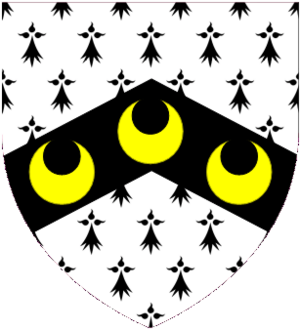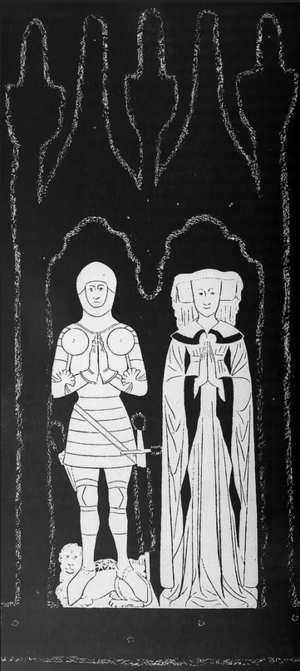John Doreward facts for kids
John Doreward (died 1420) was an important person in England. He was a Serjeant-at-law, which was a type of senior lawyer, and he also served as the Speaker of the House of Commons. This means he was the leader of the main group of people who made laws in England.
Contents
About John Doreward's Life
Not much is known about John Doreward's early life outside of his work in Parliament. He was likely the son of William Doreward, who was also a Member of Parliament (MP) for Essex. The name 'Doreward' is still found in places like 'Durward's' in Bocking and 'Durward's Hall' between Witham and Kelvedon.
In 1397, John Doreward helped set up a chantry in Bocking. A chantry was a special place, often a chapel, where priests would pray for the souls of people who had died.
John Doreward's Family
John Doreward was married twice. His first wife was Blanche Coggeshall. She was the daughter of Sir William Coggeshall, who was a High Sheriff of Essex.
His second wife was Isabella Baynard from Messing. Her name, Isabella, is written on his monument in St Mary's Church in Bocking.
John Doreward had at least one son, also named John Doreward. In 1440, his son founded an almshouse in Bocking. An almshouse was a charity house that provided food and shelter for poor people. This almshouse was also meant for prayers to be said for the soul of John Doreward, the father.
John Doreward's Political Career
John Doreward was very active in English politics. He was chosen as the High Sheriff of Essex and Hertfordshire in 1399. A High Sheriff was a royal official in charge of law and order in a county.
He was also elected as a knight of the shire, which was another name for a Member of Parliament (MP), six times for Essex. He served in Parliament in 1395, 1397, 1399, 1404, 1413, and 1414.
Becoming Speaker of the House
John Doreward was chosen to be the Speaker of the House of Commons twice, first in 1399 and again in 1413.
In 1399, another person named Sir John Cheyne was first chosen as Speaker. However, Sir John Cheyne said he was too ill to do the job. So, John Doreward was chosen to take his place.
A writer from about 100 years later, Robert Fabyan, wrote about this event. He said that Sir John Cheyne was "discharged" (let go) from the Speaker role because of his illness, and then a "Squyer named Wyllyam Durwarde" was chosen instead. This might have been a mistake in the name, as other records show it was John Doreward.
Parliament under Henry IV
The Parliament of 1399 was very similar to the one that had met under the previous king, Richard II. King Richard II had taken away many of Parliament's powers. However, the new king, Henry IV, wisely called this Parliament. It was made up of people who were not very supportive of the captured King Richard II.
The Commons, which was the group of elected representatives, agreed to give a large amount of money (called a subsidy) to pay for wars against Scotland and to defend Ireland and Calais. They hoped that by doing this, their requests for more power would be granted. The Commons also voted for the arrest of two of King Richard II's advisors.
Speaker for Henry V
John Doreward was made Speaker of the House of Commons again in 1413. This was the first Parliament held by the new king, Henry V. He was chosen after the previous Speaker also resigned due to illness.
The Parliament of 1413 gave King Henry V money for four years. This was a very long time for such a grant, and it showed how popular the new king was.
Some historians used to think that the John Doreward who was Speaker in 1399 and 1413 were a father and son. But it is now clear that it was the same person. The Speaker was a "serjeant-at-law," a special legal role, which neither of Doreward's sons held.
John Doreward was also a member of King Henry IV's council, which was a group of advisors, from November 1399 to May 1406.
John Doreward's Monument
John Doreward is remembered by a special metal picture, called a monumental brass, in St Mary's Church in Bocking. It is on the floor in front of the South Chapel. This brass shows that he died in 1420 and names his second wife as Isabella.
The Latin words on the brass translate to: "Pray to God for the soul of John Doreward, Esquire, son of William Doreward who died on the 12th day of November in the Year of Our Lord 1420 and for the soul of Isabella his wife, on the souls of whom may God look with favour."
Arms
 |
|
| Political offices | ||
|---|---|---|
| Preceded by Sir John Cheney |
Speaker of the House of Commons 1399 |
Succeeded by Sir Arnold Savage |
| Preceded by William Stourton |
Speaker of the House of Commons 1413 |
Succeeded by Sir Walter Hungerford |
 | Kyle Baker |
 | Joseph Yoakum |
 | Laura Wheeler Waring |
 | Henry Ossawa Tanner |


